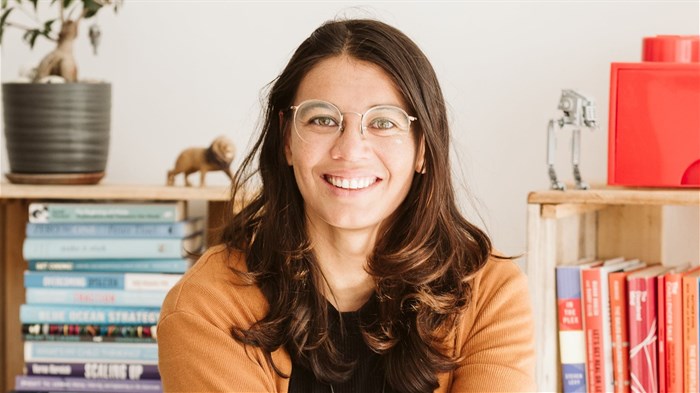Named as one of Mail & Guardian's 200 Young South Africans for 2022, Gabi Immelman is a formidable businesswoman who has used her experience in Silicon Valley, coupled with a strong entrepreneurial upbringing, to forge a place in the edtech world through the creation of Mindjoy.

Gabi Immelman, founder and CEO of Mindjoy
Here, Immelman pays tribute to the strong women in her family who helped shape her thinking, and chats to us about the inspiration for her work. She shares her secrets about staying motivated in the face of rejection and explains how she’s turned curiosity into a superpower.
Tell us a bit about yourself and how you got into edtech...
I've worked with children from all walks of life over many years, and a couple of years back I got the opportunity to spend time in Silicon Valley. There I spent three years working in one of the most resource-rich learning settings in the world; in traditional and non-traditional classroom settings in the school system as well as in the extramural, after-school clubs and holiday programmes. It was really challenging but also really exciting - spending time facilitating some of the smartest people's children in one of the top performing school districts in the world.
I learned so much during this time, but one of the most surprising things I learned was how technology was not overt in the classrooms and the way in which people learned and their orientation to learning was fundamentally different to what I was seeing in classrooms back in South Africa.
Educators in Silicon Valley were really tuned in into how young people are learning; how neuroscience works; how we build connections and understand meaning-making and learning in the brain. People were engaged in environments where they were willing to be wrong, so that they could discover things. It was fascinating to see how pedagogy evolved in this way. Technology can transform classroom but what was really valued was what self-directed learning looked like; where young people who, from kindergarten, have the opportunity to manage their own learning and learn skills such as how to manage technology integration, how to manage using screens, good screen time, connecting and collaborating with peers.
I started thinking about how that learning would translate in a South African setting and how would schools in South Africa ever be able to catch up?
That's when I realised that the most powerful technology in any classroom is not the devices or the software, but rather the transformation the minds in the classroom could undergo and that those minds were active in pursuing learning. Lifelong learning is a skill that we need to cultivate in young people.
Since then, I've been in South Africa working in various contexts. I managed a progressive school in Cape Town, and I ran all kinds of after school STEM programmes. Eventually, I just really wanted to do something leveraged and I thought that technology is a great enabler. We have the ability in South Africa to leapfrog specifically using mobile infrastructure and transform our learning environments to improve literacy, improve mathematics scores and teach things like Science, Technology and Engineering. At Mindjoy, we are very much inspired to cultivate a coaching mindset so that people can move away from cultivating cultures of compliance, and move more towards spaces that cultivate creativity and innovation.
You were recently named one of Mail & Guardian's 200 Young South Africans - congratulations! What does this kind of recognition mean for you and the work you do?
It's a great honour and privilege to be nominated in the business category amongst other legendary founders who are working on really cool startups and companies that I look up to. It's a vote of confidence - you're working on something that is meaningful and that people recognise the value of what it is you're doing. It adds fuel to the flames. It's an opportunity to amplify the mission, amplify the need to empower young people with skills so that they can build their future. It's not just a win for me; it's a win for our whole team to know that what we’re working on is being recognised. That builds a lot of trust and excitement in the team.
What are some of the challenges you've experienced in your industry and how did you overcome them?
Building anything from scratch is incredibly difficult. So I think that it is incredibly challenging to find your confidence and be audacious enough to say that “I want to build something and I'm going to go out there and do really hard challenging things and I'm going to be rejected a lot.” Anyone wanting to build something meaningful is going have to become really skilled at handling rejection. And that's really something I've found useful to contextualise in a way: it's not about me failing, and I'm not a failure. If I fail, it's just that the nature of the game. But you've got to stay motivated, and stay hungry and get out there to keep on wanting to try.
People are going think you're crazy and not necessarily think your ideas are any good. You have to figure out when is it that you know something and you need to stick to that and hold your own.
But you also need to know when to take feedback. I think that's something that people really, really struggle with is knowing how to take feedback, but also knowing how to model how it is that you'd like to receive feedback.
Learning how to give and receive feedback have been really empowering for me; knowing how to communicate to people how it is that I'd like to receive feedback, and how what things are useful or not useful for me, and knowing that I actually have a lot of control over how that process happens. This has been a game changer for me.
When building a business, you're constantly going to get feedback, which means you're constantly putting yourself in a position to get punched in the face and get feedback and hear things you don't necessarily want to hear or like. But feedback makes things grow and it doesn't care what, so be very specific about what it is you're trying to get out of something. It's like a superpower in terms of setting yourself up to get the right kind of feedback at the right time from the right people.
My strategy dealing with anything challenging is just to be curious. When I get defensive, I try and be curious; when I'm feeling angry or frightened, I'm curious; and when I'm feeling energized and excited, I'm also curious. This hyper curiosity loop has helped me uncover new understandings of the way the world works and it has helped me overcome many, many challenges when talking to investors or talking to customers or trying to sell Mindjoy to businesses. Understanding other people by being curious gives you a superpower to uncovering and overcoming a lot. You just kind of have to get over yourself in terms of your own ego and your own fear of failure and your own sense of the world is unfair, and use curiosity to guide you. You really discover so much more about people and the way things work and in that, you get to be creative and make new things and do things that seem unimaginable.
In your work with children, what have you found to be some of the stumbling blocks for girls looking to get into IT?
We have seen a lot of different things when it comes to exposure to STEM skills, specifically Coding and Computer Studies as subjects in schools. Interestingly, a lot more co-ed schools offer Computer Studies and CAT as a subject at school. We've seen a lot of girls’ schools, specifically private girl schools, not offer Computer Studies. And so what that means is that if there is a young girl who'd like to do Engineering or Computer Science at university level, because Computer Studies is not a subject that their school offers, they can't take the necessary prerequisite subjects on a school level. That young girl has to then go take the subject at a different school, and that's generally at a boys’ school, which results in a massive drop-off of girls looking to take the subject. Girls’ schools need to prioritize STEM subjects as subjects they schools offer.
Speaking as a woman in education, what should we be teaching or impressing upon on our young girls more?
STEM is for everyone, not just boys. I think what's interesting is the subjects in which you have more male teachers than female teachers - your Math, Science and Computer Science teachers are generally male. I think that poses an interesting question as to who are the models that young people are exposed to, because often young people make decisions based on, not necessarily the interest or passion in the subject, but the connections. They feel interested or passionate because of the person who is modeling the interest or passion to them. So if your model is a male and very different to you, and you don't, as a young girl, necessarily aspire to or relate to an older male teacher, as a model, you might not necessarily make a choice. And that's no fault of the male teacher as they can create really inclusive, diverse classrooms, but it's the subconscious thing of how models work for us. You might find your younger art teacher more relatable and almost make your subject choice based on that because that's an environment that you relate to more. So that's something we think about quite deeply at Mindjoy. We have diverse models for young people, so they can learn coding, but there are different people presenting this modality to them and really encouraging them to feel related and connected to the things they're doing.
Who are your female role models?
Jessica Livingston - she's one of the founding partners of Y Combinator and has done so much for female entrepreneurship in her own quiet way. She is known for having a good ability to read people and understand their sense of authenticity, and that's something I aspire to.
Another person I really look up to the entrepreneurial space is Kathryn Minshew, founder of The Muse. She is an incredible CEO, and I really love the way she talks about being an early stage founder. I’ve watched all of her videos and read a lot of her work about finding your market and building your business. I find her absolutely exceptional in this regard.
Other female role models I have are my family. My mum and both her sisters were all entrepreneurial - they all started their own businesses. When I was nine, my father passed away, so in my house and in my frame of reference of the world, women did everything and it was very normal. So growing up, I was surrounded by these really strong women. They were all kind of rebellious and maverick in many ways; they were hustlers and weren't afraid to risk starting a business. So I had a lot of female role models growing up and I now know it was a very privileged position to have women model being entrepreneurial for you, and how valuable that was in shaping my thinking of what was possible for me.






























![Today, Halo and Demographica announce a new specialist agency, Second Rodeo]], headed up by Mike Stopforth (left). Dean Oelschig, managing partner and founder of Halo (right) says they will work as a group but ultimately, each agency will be an individual specialist](https://biz-file.com/c/2505/772543-64x64.jpg?2)





